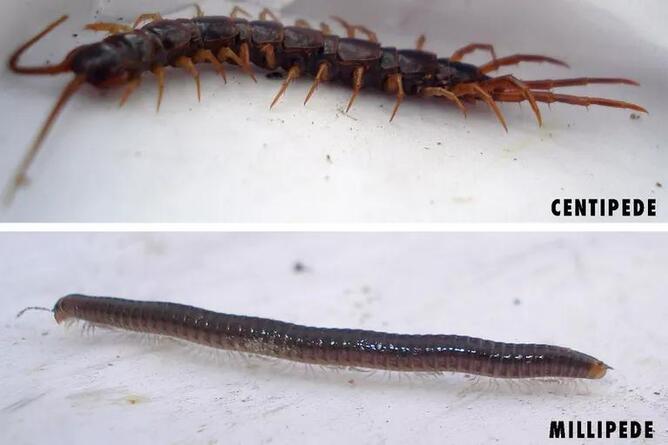rayscale: ; --tw-hue-rotate: ; --tw-invert: ; --tw-saturate: ; --tw-sepia: ; --tw-drop-shadow: ; --tw-backdrop-blur: ; --tw-backdrop-brightness: ; --tw-backdrop-contrast: ; --tw-backdrop-grayscale: ; --tw-backdrop-hue-rotate: ; --tw-backdrop-invert: ; --tw-backdrop-opacity: ; --tw-backdrop-saturate: ; --tw-backdrop-sepia: ; margin-top: 0px; margin-bottom: 1.25em; overflow-wrap: break-word; white-space: pre-wrap; color: rgb(20, 23, 24); font-family: __Karla_555e8b, __Karla_Fallback_555e8b, ui-sans-serif, system-ui, -apple-system, BlinkMacSystemFont, "segoe ui", Roboto, "helvetica neue", Arial, "noto sans", sans-serif, "apple color emoji", "segoe ui emoji", "segoe ui symbol", "noto color emoji"; letter-spacing: -0.16px; background-color: rgb(243, 245, 247);">Millipedes and centipedes are two different kinds of arthropods. They belong to different taxonomic categories and have different appearance characteristics and living habits. Here's a detailed look at millipedes and centipedes to help you understand the differences between them:
rayscale: ; --tw-hue-rotate: ; --tw-invert: ; --tw-saturate: ; --tw-sepia: ; --tw-drop-shadow: ; --tw-backdrop-blur: ; --tw-backdrop-brightness: ; --tw-backdrop-contrast: ; --tw-backdrop-grayscale: ; --tw-backdrop-hue-rotate: ; --tw-backdrop-invert: ; --tw-backdrop-opacity: ; --tw-backdrop-saturate: ; --tw-backdrop-sepia: ; margin-top: 0px; margin-bottom: 1.25em; overflow-wrap: break-word; white-space: pre-wrap; color: rgb(20, 23, 24); font-family: __Karla_555e8b, __Karla_Fallback_555e8b, ui-sans-serif, system-ui, -apple-system, BlinkMacSystemFont, "segoe ui", Roboto, "helvetica neue", Arial, "noto sans", sans-serif, "apple color emoji", "segoe ui emoji", "segoe ui symbol", "noto color emoji"; letter-spacing: -0.16px; background-color: rgb(243, 245, 247);">
boto, "helvetica neue", Arial, "noto sans", sans-serif, "apple color emoji", "segoe ui emoji", "segoe ui symbol", "noto color emoji"; letter-spacing: -0.16px; background-color: rgb(243, 245, 247);">
Millipedes:
scientific name:
Millipedes belong to a category in the class Myriapoda and are often called millipedes or centipedes. Representative species include Geophilomorpha and so on.
Physical characteristics:
Millipedes usually have many pairs of legs and are named "millipedes" because of the many segments in their bodies, although they usually don't actually have thousands of legs.
Living habits:
Most millipedes live in humid environments, inhabiting soil, under fallen leaves, or in rotten wood. They mainly feed on decaying organic matter and are beneficial decomposers.
feeding habits:
Most millipedes are herbivorous or detritivorous, providing ecosystem services by breaking down humus and organic matter.
Centipede:
scientific name:
Centipedes are arthropods in the class Chilopoda. They and millipedes belong to another class, Myriapoda.
Physical characteristics:
Centipedes usually have fewer pairs of legs, usually one pair of legs per body segment, and a pair of sensory organs, the centipede's antennae, on the head.
Living habits:
Centipedes generally live in humid environments and like to live underground, under trees or under rocks. Some species also live in water.
feeding habits:
Centipedes generally feed on other insects and small invertebrates. They are predatory arthropods and live by hunting.
Summary of differences:
body structure:
Millipedes have many segments, and each segment usually has one pair of legs; while centipedes have only one pair of legs per segment.
Living habits:
Millipedes mainly feed on decaying organic matter and are decomposers; centipedes are predatory and feed on other insects and small invertebrates.
Classification:
Millipedes and centipedes belong to different taxonomic categories, with the former belonging to the class Myriapoda and the latter belonging to the class Centipede.
To sum up, although millipedes and centipedes may give people similar impressions in appearance, there are obvious differences in their classification, living habits and feeding habits. They are two independent groups of arthropods.
animal tags: millipede centipede
We created this article in conjunction with AI technology, then made sure it was fact-checked and edited by a Animals Top editor.